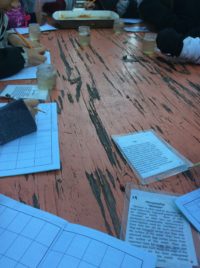So You Don’t Know All the Answers

I remember the months leading up to my start in outdoor education. I was panicky and doubtful. When I began my career teaching environmental education I was in East Texas. The landscape there was foreign to me because I grew up in Iowa.
I was tormented with thoughts of inadequacy and fear of not knowing all the answers to my students’ questions since I knew very little of the environment there. Luckily, seven years later, I have a new outlook on teaching environmental education.
My experiences with the students and with mentor teachers and principles have taught me that it is okay to not know all the answers! Let me repeat that, “it is OKAY to not know all the answers”! This has been a freeing nugget of knowledge for me.
Humor me for a second. Stop reading this and simply think about why it is okay to not know the answer to every question posed by the students. After you have thought for a moment read on.
You may have noticed that I just did a teaching strategy on you! I had you stop and think. If I was sitting in an outdoors setting with students and they asked me a question that I did not know I would execute the same strategy with them.
Moreover, I would allow them to collaborate with the students around them to see what answers they could come up with together. In this process I am encouraging student’s critical thinking skills plus allowing them to practice communicating with others. Both are vital to their success as human beings. In the end, the students may come up with an answer.
 Likewise, students love to hear me say, “That is a great question that I don’t know the answer to. How about we investigate together?” Next, I ask them to think about what they already know or believe. Then we gather information at hand.
Likewise, students love to hear me say, “That is a great question that I don’t know the answer to. How about we investigate together?” Next, I ask them to think about what they already know or believe. Then we gather information at hand.
Students draw conclusions and then share them with their classmates. In the end, the students may or may not have the right answer. And that is fine. What the students have done was build on prior knowledge, collect data, and collaborate with peers. All of which are essential to adulthood.
The world is teeming with life and mysteries. Our fears of not knowing everything should not hold us back from taking our students outside. When we are willing to be vulnerable and say that we don’t know all the answers, we open the door to more profound learning experiences.

I love this. It’s so applicable to me! I’m the type of person that wants to really know everything if I’m in any type of leadership role (like teaching!). But of course, we can’t know everything. It’s good to ask questions and show kids that we can learn (and that learning is fun!).